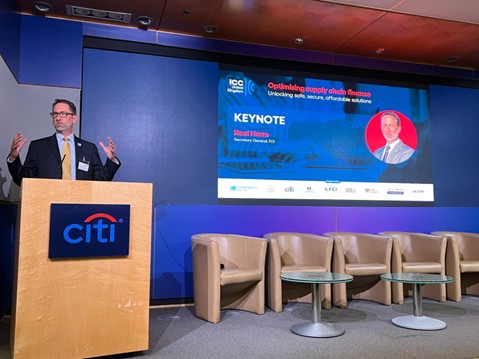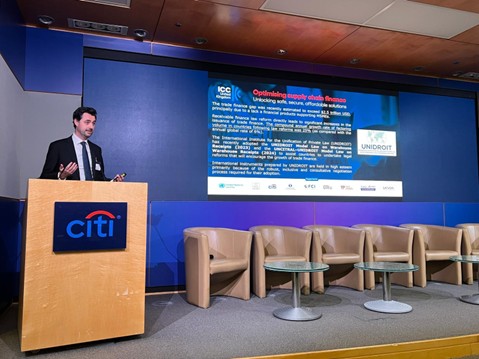Optimising supply chain finance: Unlocking safe, secure, affordable solutions
This is a summary of key learning points from our half-day conference that took place on 12 May 2025. This conference was co-organised by the Queen Mary-UNIDROIT Institute for Transnational Commercial Law and ICC-UK.

Opening Speech: Parvaiz Dalal, Chair, UK Trade Finance Committee, Citi
Parvaiz Dalal opened the session by highlighting Citi’s dominant global position in supply chain finance—operating in 88 countries with a 24% global market share. Emphasising the strategic significance of supply chain finance amid global disruption, he explained that trade patterns are shifting due to changing tariffs and legal developments; this is accelerating the trend toward regionalisation and localisation of supply chains. Citi anticipates a deepening focus on domestic supply chains by those providing financing for second and third tier as well as last-mile suppliers. Citi noted that greater digitisation is necessary to ensure transparency and to unlock finance at deeper levels of the supply chain.
Mr Dalal then addressed macroeconomic factors influencing supply chains. He noted that, unlike during the COVID period when inventories were built up, current trends show businesses pausing due to tariff uncertainty. He also noted that tariffs may also influence the direction of goods – their shipping paths. Rising costs are triggering negotiations between buyers and suppliers over who should absorb tariff burdens; this is squeezing supplier margins. He noted that careful inventory management is becoming critical and warned of possible increased insolvencies of suppliers reliant on a single buyer, noted supplier liquidity challenges and highlighted growing exposure of trade finance ecosystems to fraud and cyber risk. To respond to these challenges, Citi is strengthening its systems and internal processes while the industry is advised to diversify and prioritise end-to-end supply-chain solutions to navigate these risks effectively.

Opening remarks
With Professor Rosa Lastra, QMUL, and Professor Anna Veneziano, UNIDROIT, Co-Directors of the QM-UNIDROIT Institute for Transnational Law.
The Co-Directors introduced the topic of the conference, which would focus on the existing problems and legal solutions to facilitate the financing of SMEs in the global supply chain. The conference would address the impact of the newly approved UNIDROIT Model Law on Factoring and UNCITRAL-UNIDROIT Model Law on Warehouse Receipts, placing them into the framework of other existing global guidance instruments on the use of digitisation and technology, such as the UNCITRAL Model Law on Electronic Transferable Records.

Keynote Speaker 1: Neal Harm, FCI
Neal Harm emphasized FCI's role in building a more resilient and inclusive global supply chain finance network: it connects 400 banks and other financial institutions across 90 countries. He called for greater uptake of deep-tier financing and highlighted the need for supply chain finance to move beyond focusing solely on the final stages of the supply transaction. He explained that because an unconfirmed receivable may have value under local laws, adding local banks to the supply chain finance transaction can help extract value earlier in the process. The next step is therefore to begin leveraging local financing expertise and knowledge of local laws. Mr Harm concluded by observing that the Model Law on Factoring would help achieve consistency between different countries’ laws on factoring, thus creating a seamless and adaptable financing infrastructure capable of withstanding global trade disruptions.

Keynote Speaker 2: William Brydie-Watson, UNIDROIT
William Brydie-Watson began by noting that the global trade finance gap, currently estimated at $2.5 trillion annually, is particularly acute in developing countries due to the barriers that prevent SMEs from accessing credit. Many of these businesses lack the collateral required for traditional financing and instead need to use receivables or warehouse receipts. However, legal uncertainty, such as vague rules around transfers of receivables and security rights in them, or around negotiability of physical and electronic warehouse receipts discourages banks from providing finance, perpetuating this gap.
Mr Brydie-Watson then explained how the UNIDROIT Model Law on Factoring and the UNIDROIT/UNCITRAL Model Law on Warehouse Receipts can help address this gap. These model laws received extensive input from legal, finance and private sector representatives. They offer clear frameworks in line with international best practice that countries can adopt to modernise their domestic legal systems. Mr Brydie-Watson stressed that countries that modernised their laws enjoy a rate of growth in factoring volumes far greater (25%) than the average rate of organic growth (6%). He referred to empirical evidence from countries like Egypt, India and Chile that shows that such reforms lead to a significant rise in trade finance activity.
Mr Brydie-Watson concluded by emphasising that successful implementation requires more than simply adopting the Model Laws. It must be accompanied by regulatory reforms (such as licensing and supervision rules) and broad-based collaboration among governments, legal experts, financial institutions and the private sector. In saying this, he underscored the need for the industry and other stakeholders to be the driving force behind those changes.

Panel 1: Creating a model legal framework for economic growth
Moderator: Professor John Taylor (CASTL & QMUL).
Panellists:
- Professor Jean-François Riffard, Dean, Ecole de Droit– Université d’Auvergne – Clermont-Ferrand (France),
- Professor Miriam Goldby, CCLS, QMUL,
- Frederick Rugginz, Head of EMEA & APAC Supply Chain Finance, JPM Chase,
- Tim Nicolle, Founder, PrimaTrade,
- Luca Castellani, Secretary, UNCITRAL Working Group I (Warehouse Receipts).
Key Points:
Importance of Certainty for Lenders
The panel agreed that legal uncertainty is an obstacle for companies seeking to obtain supply chain finance. Where the law does not clearly set out the trade financier’s legal position, and particularly the validity or enforceability of any security rights they may have taken, the result is higher costs or more onerous conditions for SME borrowers, such as property charges or personal guarantees. Lenders are driven to develop alternative processes to address this uncertainty - for example, using electronic trade documentation where possible to acquire ownership of the goods instead of a security interest. This further underscores the importance of digitalising trade finance.
Law Reform as Catalyst for Change
All panellists agreed that the Model Laws will drive change, making financing more accessible. Underdeveloped supply chain finance laws are one of the reasons why lenders choose to stay out of jurisdictions despite market demand. Several panellists drew attention to the fact that the Model Laws could be implemented alongside other instruments to open the widest possible range of avenues for lenders or to achieve a desired supply chain finance regime. Important differences between the Model Laws were highlighted, for example relating to the presence of substantive provisions.
Digitalisation, Transparency and Information Flows
The panel explained that the Model Laws aim to digitalise the supply chain end-to-end. It was noted that digitalisation can facilitate supply chain lending. However, there was some disagreement as to the mechanism. Some noted that digitalisation would increase visibility of transactional flows for the lender, resulting in better-quality and quicker lending decisions. If lenders can access information relevant to an electronic document from third parties, this provides them with additional peace of mind from which the borrower benefits. Others, however, thought that digitalisation would mostly assist with getting the buyer to approve the invoice more quickly, since common practice dictates that until this is done, no funds will be made available. One of the panellists commented that digitalisation could increase the reliability of warehouse receipts.

Panel 2: Financing growth and solving the trade finance gap
Moderator: Clare Bottle, CEO, UK Warehousing Association
Panellists
- Professor Louise Gullifer, Rouse Ball Professor of English Law, Cambridge University,
- Andy Greaves, HSEQ Manager, Commodity Centre Group,
- Mark Sutcliffe, Co-Founder, BOEXc
Key points
The Impact of the Model Laws
The panel discussion first emphasised the need for legal reform. Such reform is necessary to drive digitalisation as well as to clarify mechanisms for transfers of rights of payment or delivery. Digital systems have several advantages, such as enabling more efficient compliance with regulatory requirements and better access to records in cases of disputes. Trade documents in paper form solved legal problems like fraud and double pledging through physical possession; digital systems must replicate these functions through appropriate control mechanisms. Where countries already have a strong underlying regime applicable to paper-based trade documents, they would be well-advised to extend that regime to electronic documents. However, an added benefit of the Model Laws is that they provide conflict-of-law provisions in addition to domestic rules, helping to determine the law governing an international transaction. This is important particularly where parties choose to apply another country’s laws to the transaction because of the lack of domestic instruments.
Advantages of Digitalisation
The panel highlighted how digitalisation directly benefits warehouse operators and SMEs in practice. Barcoding, digital inventory systems and stock mapping streamline warehouse operations, improve stock traceability, increase client trust and create a financing avenue. Digitalising payment instruments like the bill of exchange enables faster financing for SMEs, reduces fraud and automates data entry, avoiding mistakes and omissions. SMEs are agile enough to benefit early from digital tools, especially if given clear incentives and support. In addition to the UK, jurisdictions actively digitalising trade include Singapore and the UAE.
Beyond the Law Reform
The panel concluded by stressing the importance of trust frameworks, interoperability and global coordination. Warehousing standards, like ISO 9001 and BRC accreditation, can act as ‘trust signals’ that help banks assess risk and provide finance. Adoption and compliance with these indicators are important complements to legal reform. Another critical factor for success is the use of systems based on secure interoperable platforms that provide sufficient and timely information to all trade players. Ultimately, the panellists agreed that solving the finance gap depends not only on law reform and technology, but also on cultural and mindset change across the spectrum of trade actors.

Endnote Speaker: Chris Southworth, Secretary General, ICC UK
Chris Southworth began by saying that despite frequent references to digitalisation, it cannot be assumed that all stakeholders understand its implications. He noted that the UK’s forthcoming trade strategy will place digitalisation at its core but underscored the importance of integrating the physical and financial supply chains. He praised existing UK legal infrastructure but stated that international reform, especially in emerging markets, remains a priority.
Mr Southworth then highlighted recent and upcoming efforts to promote legal harmonisation and support global digital trade, including the Commonwealth Model Law initiative and broader regulatory reform agendas. He said that the business community must help governments, particularly those with limited legal capacity, understand what reforms are needed and why. Regulatory frameworks were described as an obstacle, especially when it comes to unlocking the finance already present in the system. He emphasised the need to simplify bureaucratic processes like KYC and stressed that the trade finance gap, both in the UK and globally, can only be addressed if trade finance is recognised as a standalone asset class and regulatory systems are modernised accordingly.
In closing, Mr Southworth laid out several calls to action. For the UK government, he said more could be done in its own supply chain, noting a massive potential impact on crucial sectors like health and defence. Foreign governments were encouraged to focus on legal infrastructure development, with business communities playing a key role in guiding them. For finance providers, simplification and clearer language were identified as essential, particularly to support SMEs. He concluded by highlighting education as the most critical priority—educating SMEs on digitalisation and finance opportunities from end to end.